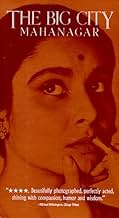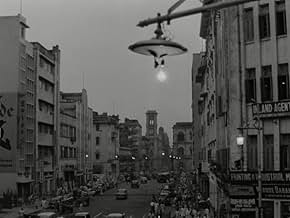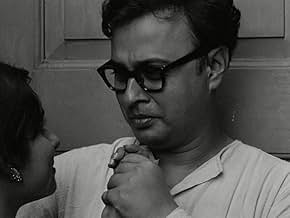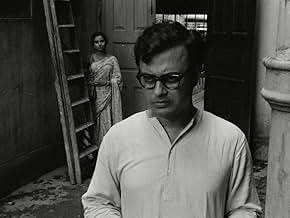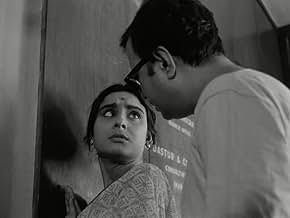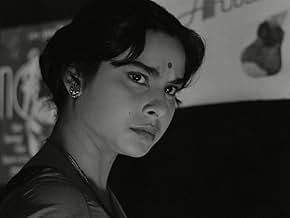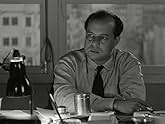Adicionar um enredo no seu idiomaLife at home changes when a house-wife from a middle-class, conservative family in Calcutta gets a job as a saleswoman.Life at home changes when a house-wife from a middle-class, conservative family in Calcutta gets a job as a saleswoman.Life at home changes when a house-wife from a middle-class, conservative family in Calcutta gets a job as a saleswoman.
- Direção
- Roteiristas
- Artistas
- Prêmios
- 4 vitórias e 1 indicação no total
- Arati Mazumder
- (as Madhabi Mukherjee)
- Bani
- (as Jaya Bhaduri)
- Sarojini (Subrata's Mother)
- (as Shephalika Devi)
- Himangshu Mukherjee
- (as Haradhan Banerjee)
- Direção
- Roteiristas
- Elenco e equipe completos
- Produção, bilheteria e muito mais no IMDbPro
Avaliações em destaque
After having finished watching Mahanagar, I felt that the lonely house wife I had seen earlier had achieved a sense of fulfillment..a sense of completion.The entire film is a microcosm of an typical urbane family of the 1960's Calcutta. The legendary city of Calcutta in the 1960's has been impressionistic-ally captured with all its charm as well as confusion.We can see some of the best well-scripted, realistic emotional sequences. An young Jayabhaduri too appears as the little sister of Mr. Mazumdar(The main character's husband). Madhabi Mukherjee again dons a intense character and proves her brilliance in acting.Now I have become impatient enough to watch Ray's Calcutta Trilogy and other films too.It is very difficult to get good prints of most of them.
Ray had based this film on Abataranika, a Bengali short story. All the actors have been handpicked-especially Anil Chatterjee and Haren Chatterjee-who played the role of Mr. Mazumdar and his father.The film was well-received at the 14th Berlin Festival and Ray won a Silver Bear for direction. Even though it was rejected at the Oscars, it received an All India merit certificate at the National awards that year.
We see all sorts of manifestations of duality in Mahanagar. The tension-cum-rivalry of Arati and Subrata is, of course, the most obvious manifestation. However, we also have the duality of the new- generation Arati/Subrata and the old-generation Sarojini/Priyogopal (Subrata's mother and father) and Arati, who wears traditional clothing and speaks Bengali, versus Edith, the English-speaking Anglo-Indian in Western dress. These instances of duality speak directly to the moment in which things began to make a 180-degree shift in India, when women became the breadwinners of the household and traditional gender norms became subsumed by sexual liberation.
With a leading lady as precise as Mukherjee, Ray was able wrap these complex coterminous processes up in a relatively tidy package. Mahanagar is essential viewing.
The Big City is a subtle, flowing work about a young housewife (Madhabi Mukherjee, who would also star in Ray's Charulata) in a middle-class family who finds a job when her father-in-law needs a new pair of spectacles. The family is very conservative, and this upsets everyone. Her husband's manhood is somewhat insulted, her father- and mother-in-law (who both live with the married couple in a rather small apartment) feel that it's just not right, and her son thinks he's been forgotten. The only one who supports her is her younger sister-in-law; she sees her as a role model. The husband (Anil Chatterjee) tries to get her to quit, but, when he loses his own job, he changes his mind quickly. Now she becomes the breadwinner, and he is effectively castrated.
This could have been a little, humble film, like many of Ray's works. But here he decides to examine a huge portion of his own culture, setting up many opposites and studying them closely. We have the husband and wife, man and woman, old-world conservatism and new-world progression, young and old, employer and employee. The list goes on. The depth of this film is nearly endless, and I'm sure it would hold up to any number of repeated viewings. The only flaw that I can see is a somewhat contrived climax - Ray had this problem in a few of his films.
I do have to give special praise to the two leads. Mukherjee and Chatterjee are just brilliant in the film. The supporting cast is also uniformly excellent.
Você sabia?
- CuriosidadesFifteen-year old Jaya Bhaduri's (later known as Jaya Bachchan) film debut and her only film with Satyajit Ray.
- Erros de gravaçãoWhen Priyogopal (Subrata's father) goes to visit his student Anupam Roychowdhury to ask for money he is shown having a conversation with Anupam in his office. When he is explaining his circumstance the camera shows him only sitting on a chair with his walking stick. In the very next scene when all the three characters are shown (third one being Anupam's wife ) the top of his walking stick has changed direction. The round bit on top was towards the right before and is turned to the left in the very next scene.
- Citações
Arati: You wouldn't recognize me on the job.
Subrata Mazumdar: What about at home? Would I recognize you at home?
Arati: You don't recognize me? Tell me honestly.
[Subrata shakes his head no]
Arati: Why not?
Subrata Mazumdar: It all feels a bit unfamiliar. It feels a bit...
Arati: What about this?
[points at her cheek]
Arati: You don't recognize my mole? I'm still the same housewife.
- ConexõesReferenced in Creative Artists of India: Satyajit Ray (1964)
Principais escolhas
- How long is The Big City?Fornecido pela Alexa
Detalhes
- Data de lançamento
- País de origem
- Central de atendimento oficial
- Idiomas
- Também conhecido como
- The Big City
- Locações de filme
- RN Mukherjee Rd, Calcutá, Bengala Ocidental, Índia(closing shot: view of the city)
- Empresa de produção
- Consulte mais créditos da empresa na IMDbPro
- Tempo de duração2 horas 16 minutos
- Cor
- Mixagem de som
- Proporção
- 1.37 : 1
Contribua para esta página



